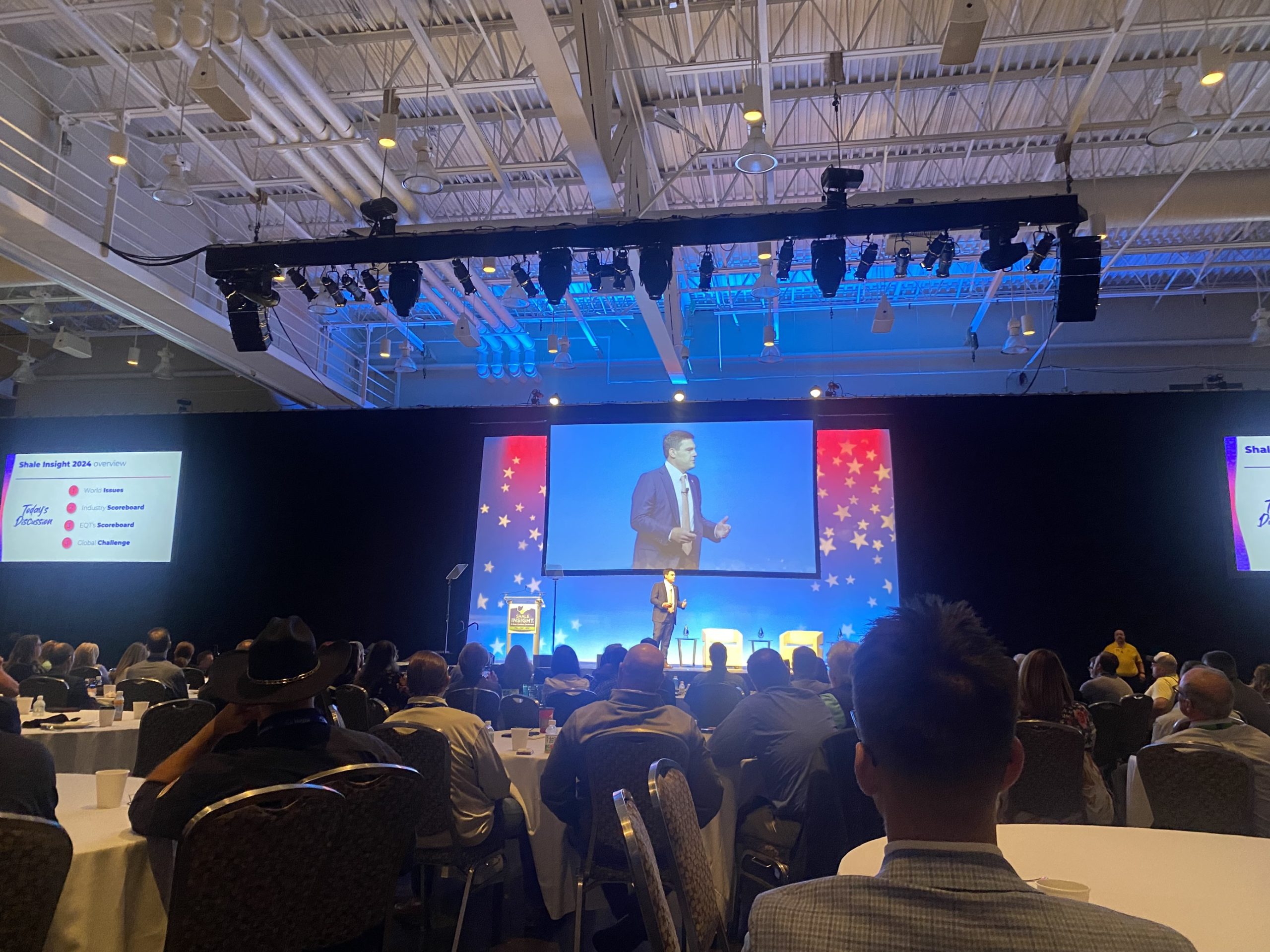Pennsylvania’s robust natural gas sector – as well as professional service firms, contractors and vendors up and down the supply chain – are determined to safely and responsibly provide the clean energy society demands, industry executives and leaders reaffirmed at Shale Insight recently.
During several keynote speeches at the two-day conference, attendees heard directly from those shaping the future of American shale development and use on the unique ways companies are evolving to answer the call for more affordable, reliable and clean energy across the world.
Together, the underlying message was clear: not only is this industry essential to meeting the everyday needs of our fellow citizens, but it is also committed to continuous improvement and collaborating on the best practices that benefit both society and the environment.
Here are some highlights from this year’s main stage:
Olympus Energy, Tim Dugan
Tim Dugan, President and CEO of Olympus Energy, emphasized the role of innovation stemming from collaboration with local universities like Penn State, Washington & Jefferson College and West Virginia University.
“It’s [natural gas] an industry that is vital to every economy in the world,” Dugan stated. He underscored the need to support educational institutions, ensuring that the pipeline of talent and knowledge remains robust. “The advancements that we’ve seen—they’re based on education. We’ve learned to improve our operational aspects. We’ve shared safety learnings and worked collaboratively to enhance our environmental protections through constant learning and education.”
Olympus Energy’s commitment to innovation includes real-time monitoring of methane, VOCs and emissions directly at their sites. Dugan noted that these practices are not only applied locally but are also being implemented in the deeper Utica region, demonstrating a commitment to responsible energy development.
CNX Resources, Hayley Scott
The theme of responsibility echoed throughout the conference, with speakers like CNX’s Chief Risk Officer, Hayley Scott, sharing insights from the company’s “Radical Transparency” initiative. “We have a proud legacy of pioneering the next thing,” she said, recalling their early adoption of coal bed methane capture. “We achieved it in the arena of safety before talking about safety was in vogue.”
She articulated the importance of community engagement as a cornerstone of their Sustainable Business Model, emphasizing that effective collaboration stems from transparency, dialogue, and active listening. Scott reinforced the need to confirm that responsible natural gas development poses no adverse human health risks and called upon various sectors—government, media, academia, and environmental groups—to let data guide their decisions.
MPLX, Jim Crews
“Preparing for success is a lot more difficult than creating success,” said Jim Crews, Vice President of Northeast Business Development for MPLX, during his presentation on the vital role of the midstream sector across the industry. This phase, encompassing transportation, storage and processing, serves as the crucial link between production and consumers. Crews emphasized that successful preparation involves investing in infrastructure and technology to enhance efficiency across the value chain. In his view, proactive investment and innovation are essential for navigating challenges and seizing opportunities to expand profit across the industry. His insights reflect a commitment to not just current success, but to paving the way for a sustainable energy landscape, with natural gas at the forefront.
Coterra Energy, Thomas Jorden
Tom Jorden, CEO of Coterra Energy, provided insights on the necessity of advancing productive public policy outcomes across the E&P space to address our energy needs and support the development of natural gas. He emphasized that in our approach to advocacy, we must frame our conversations with data-driven analyses. With the upcoming November election, stakeholders must be mindful of the potential challenges ahead and foster collaborative efforts between the energy sector and policymakers. Only then can we create a regulatory environment that not only encourages innovation and investment in natural gas infrastructure but also prepares us to tackle the complexities of the evolving energy landscape. His call to action underscores the importance of proactive engagement and informed conversations to ensure that our policies meet current demands while paving the way for a more resilient energy future.
Encino Energy, Ray Walker
“It is becoming more and more clear to everyone that this industry, and the fuel that we create, is critical to our future,” said Ray Walker, COO of Encino Energy. This statement resonates deeply across the energy sector, particularly as the demand for reliable and affordable energy sources continues to grow. The recent advances made by companies like Encino, especially with strategic acquisitions like the 1 million acres of Utica Shale leasehold in Ohio, highlight how the industry is adapting to meet these challenges. By optimizing operations and investing in innovative technologies, the industry is unlocking further resources and increasing production levels.
Institute of Energy Economics, Japan (IEEJ), Ken Koyama
Keynote speaker Ken Koyama, Chief Economist and Senior Managing Director for IEEJ, presented insights on the future opportunities and challenges facing the global energy market and the critical role U.S. liquefied natural gas (LNG) plays globally. He emphasized the critical need to pursue both energy security and decarbonization efforts, particularly in the context of Japan and Asia. His insights underscored the importance of global strategies that address both immediate energy demands and long-term goals, making it all the clearer that the U.S. LNG sector is poised to play a significant role in supporting global energy security for our allies overseas.
EQT, Toby Rice
EQT’s CEO, Toby Rice, addressed the critical role of natural gas in shaping an affordable, reliable and clean energy future. “It’s never been more important for us to produce energy in this country,” he noted, highlighting the urgent need for domestic energy production amid global supply chain challenges and rising energy costs. Rice emphasized that natural gas is not a transitional fuel, but a cornerstone of a sustainable energy strategy that can effectively balance environmental concerns with economic needs. As he concluded, his message resonated with attendees: the time for action is now, and a robust natural gas sector is essential for driving the nation, and globe, toward a secure and sustainable energy future.
Seneca Resources, Todd Abbott
“All energy sources must be safe, reliable, affordable and sustainable. Natural gas checks all those boxes,” said Todd Abbott, COO of Seneca Resources. Abbott highlighted significant aspects of Seneca’s work that underscore the aforementioned pillars. He emphasized that the company prioritizes keeping their employees, contractors and communities safe whilst sharing that they have had no accident reports in the past two years. On reliability, he said that Seneca has “put tremendous investment into our infrastructures, pipelines, compressors, distributions network and technology”. Citing an AGA report, he shared that only 1 in 650 natural gas customer is expected to experience a planned or unplanned outage in a given year.
To touch on affordability that natural gas provides, Abbott remarked, “Pennsylvania thrives when the natural gas economy is thriving,” reinforced by the findings of their parent company National Fuel Gas- which tracked that the average residential customer bill for the state declined from $168 per month in 2008 to $72 in 2024. In closing, Abbott revealed that Seneca had hit their sustainability goals of reducing their emissions by 40%, 7 years ahead of schedule in 2023. “These places [public lands] are special and need to be protected for ourselves, our kids and our grandkids,” he said. “Our tax and impact fees generate millions of dollars to go toward the preservation of these lands and improvement projects. We’ve also established very meaningful projects with conservation groups locally and regionally.”
Expand Energy (formerly Chesapeake Energy and Southwestern Energy), Josh Viets
“There’s never been a transaction that had more industrial logic than our combination with Southwestern [Energy], and where that really shows up is in the synergies that we will deliver,” said Josh Viets, Executive Vice President and Chief Operating Officer of Chesapeake Energy as he addressed the company’s merger with Southwestern Energy (SWN) creating Expand Energy. Viets shared personal anecdotes that illustrated the energy security issues abroad. After a week in Europe, he recalled learning that the U.K. government removed a $500 a month subsidy from their elderly citizens. “You can imagine the impact that would have on pensioners as they are struggling to get by as a result of their high energy costs,” he said. Additionally, in Ireland, the local government opted to shut down and hold new developments as data centers put too much strain on their grid; while in Germany, a local resident shared with Viets that they are ‘tired of paying high energy prices’.
In the U.S., especially in Appalachia, residents have access to natural gas which is both a reliable and affordable. While the energy pain points of the European market may appear far from the American experience, they underscore the importance of continuing to invest in natural gas. However, “we are really never too far from experiencing the same type of tragedies that they face, if we don’t have better policy makers making pragmatic decisions to support us as citizens of this country,” explained Viets.









